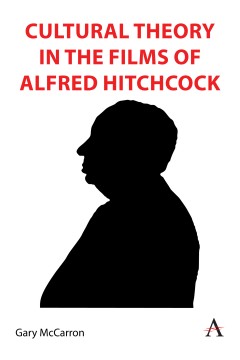Cultural Theory in the Films of Alfred Hitchcock
By Gary McCarron
Other Formats Available:
- About This Book
- Reviews
- Author Information
- Series
- Table of Contents
- Links
- Podcasts
About This Book
McCarron approaches the work of Alfred Hitchcock in a way that is unique in the world of film critique. Rather, than provide a biographical overview, or consider Hitchcock’s work in the context of conventional film criticism, McCarron uses Hitchcock’s films to illustrate ideas at play in the social sciences and philosophy even as he uses those same ideas to illustrate central aspects of Hitchcock’s films. In short, while McCarron focuses on many of Hitchcock’s most celebrated films, his broader concern is with a series of ideas crucial to Hitchcock’s work as an innovative artist of the cinema. For example, McCarron interrogates the idea of the MacGuffin, Hitchcock’s famous term for the motivating issue in a film’s narrative. However, there is far more to the idea of the MacGuffin than is found in Hitchcock’s description, as McCarron shows how political theorist Ernesto Laclau’s theory of equivalential substitution effectively explains how the MacGuffin functions as a device to bridge the divide between the film’s exegesis and the audience’s emotional engagement in the story. In a similar vein, McCarron undertakes a close reading of Hitchcock’s theory of ‘pure cinema,’ indicating that while the concept is widely embraced by Hitchcock scholars, rarely do those scholars agree on what Hitchcock ultimately intended by the phrase. Tracing the development of the concept across the years, McCarron shows how Hitchcock’s theory of pure cinema resonates with anthropological concepts of purity and even finds a place in current debates regarding so-called hybrid media. McCarron further explores Hitchcock’s alleged moralism, showing how the problem of moral agency was often treated in Hitchcock’s films as a highly complex and decidedly ambiguous condition. McCarron indicates the importance of re-viewing Hitchcock’s films from points of view that plainly show that Hitchcock is not properly understood when simply described as ‘the master of suspense,’ as his films are of enduring interest for a range of reasons that go well beyond their relevance for traditional film studies. Interpretations of his films gain in power and scope when we extend our analyses to the intricate interpretations of his work as it touches on subjects as diverse as politics, feminism, rhetoric, and philosophy. McCarron treats these larger intellectual constellations in considerable detail, bringing a fresh perspective to the study of the famed director’s work.
Reviews
A seminal and ground-breaking work of original scholarship, "Cultural Theory in the Films of Alfred Hitchcock" by Professor Gary McCarron will hold a very special appeal to readers with an interest in film criticism in general, and an analysis of Alfred Hitchcock's cinematic philosophy in particular. Exceptional, informative, thought-provoking, and unique, "Cultural Theory in the Films of Alfred Hitchcock" is especially and unreservedly recommended for personal, professional, community, film school, and college/university library Cinematic Studies collections and supplemental curriculum studies lists. -- Midwest
“Gary McCarron uses an impressively broad range of theoretical frameworks to tease out hitherto-overlooked meanings, implications, and ramifications of selected Hitchcock movies. These complementary essays add up to a prismatic account of Hitchcock’s work and a stimulating excursion into varied philosophical and sociological territory.” — David Sterritt, Editor-in-Chief, Quarterly Review of Film and Video
“Our thirst for watching and thinking about the films of Alfred Hitchcock is unquenchable. Here, both cogently echoing many arguments and stretching into challenging and exciting new territory, Gary McCarron positions Hitchcock’s analytical vision, refreshing the films for currency, even urgency, and offering a table of Hitchcockian delights.” — Murray Pomerance, Independent Scholar and Adjunct Professor, Dept. of Media and Communication, RMIT University, Melbourne
“An insightful investigation of Hitchcock’s films, from his silent cinema to his later work. From The Lodger and Blackmail to The Wrong Man and The Birds, McCarron uses communication studies, psychoanalysis, and philosophy as critical entry points into studying Hitchcock’s motifs and methods.” — Blair Davis, Professor, College of Communication, DePaul University, Chicago
“An engaging, exploratory book. The author is especially adept at pursuing ideas, whether those of Hitchcock or his films or of critics and philosophers, that are contradictory or partial and also rich in possibilities for further thought. Is suspicion a method or an affliction? Or something else?” — Michael Wood, Princeton University
Author Information
Gary McCarron is an associate professor in the School of Communication at Simon Fraser University. He is also the Graduate Chair of Simon Fraser University’s program for Graduate Liberal Studies.
Series
Table of Contents
Acknowledgements; Introduction: Re-viewing Hitchcock’s Films; 1.The Incidental MacGuffin: Equivalence and Substitution; 2.The Myth of Ideal Form and Hitchcock’s Quest for Pure Cinema; 3.Ambiguity and Complexity in The Birds; 4.Telling the Truth and The Wrong/ed Man; 5.Alfred Hitchcock’s Blackmail and the Problem of Moral Agency; 6.Hitchcock’s Debt to Silence: Time and Space in The Lodger; 7.Hitchcock’s Deferred Dénouement and the Problem of Rhetorical Form; 8.Moralizing Uncertainty: Suspicion and Faith in Hitchcock’s; Suspicion; Index
Links
Stay Updated
Information
Latest Tweets



